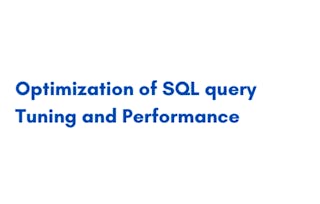The course "Distributed Query Optimization and Security" provides a comprehensive exploration of query optimization and data security in distributed databases. Students will gain in-depth knowledge of how to secure data access through views and dynamic authorization techniques, essential for maintaining the integrity and confidentiality of distributed systems. Learners will also master distributed query processing, understanding how to evaluate, optimize, and implement efficient query plans. The course uniquely blends advanced database security techniques with practical applications of large-scale data systems, such as Hadoop, MapReduce, and HDFS.

Distributed Query Optimization and Security

Distributed Query Optimization and Security
This course is part of Large-Scale Database Systems Specialization

Instructor: David Silberberg
Included with
Recommended experience
What you'll learn
Learners will gain skills in implementing database security through views, dynamic authorization, and semantic integrity rules.
Students will understand query optimization techniques, cost evaluation, and the creation of optimized query plans to enhance database performance.
Learners will master distributed query optimization, using cost models, MapReduce, and HDFS for efficient data storage, compression, and processing.
Skills you'll gain
Details to know

Add to your LinkedIn profile
9 assignments
See how employees at top companies are mastering in-demand skills

Build your subject-matter expertise
- Learn new concepts from industry experts
- Gain a foundational understanding of a subject or tool
- Develop job-relevant skills with hands-on projects
- Earn a shareable career certificate

There are 4 modules in this course
This course delves into advanced topics in query processing and data security within distributed databases. Students will learn about semantic data control, including the use of views and authorization techniques, to secure data access. The course also covers distributed query processing, and optimization methods. By understanding these techniques, learners will develop skills to create optimized, secure distributed databases capable of handling complex data queries. This module also introduces another paradigm of large-scale data systems supported by Hadoop, MapReduce and HDFS.
What's included
2 readings
This course provides an in-depth exploration of database security, focusing on defining and implementing views for secure data access. Students will learn how to apply dynamic authorization techniques through cascading grant and revoke policies, and specify semantic integrity rules essential for maintaining security and consistency within distributed database systems.
What's included
3 videos4 readings3 assignments
This course delves into the critical aspects of query optimization in databases, focusing on the motivation behind optimizing queries, evaluating the cost-effectiveness of various query plans, and understanding the steps involved in the optimization process. Students will learn to calculate optimization costs and decompose SQL queries into efficient, optimized query trees, enhancing overall database performance.
What's included
3 videos4 readings3 assignments
This module delves into distributed query optimization techniques, introducing key methodologies to improve performance in distributed systems using cost models and heuristics for near-optimal query plans. Learners will gain practical skills in query optimization, leveraging the semi-join algorithm. Learners will also gain experience in another popular large-scale data approach embodied in MapReduce supported by the Hadoop Distributed File System (HDFS) to efficiently process large datasets. Through hands-on exercises, students will practice writing HDFS code for data storage and manipulation, focusing on data compression and decompression, and employ advanced MapReduce patterns for optimal data processing..
What's included
6 videos6 readings3 assignments
Earn a career certificate
Add this credential to your LinkedIn profile, resume, or CV. Share it on social media and in your performance review.
Instructor

Offered by
Explore more from Software Development
 Status: Free Trial
Status: Free TrialBoard Infinity
 Status: Preview
Status: Preview Status: Free Trial
Status: Free TrialJohns Hopkins University
Why people choose Coursera for their career

Felipe M.

Jennifer J.

Larry W.

Chaitanya A.

Open new doors with Coursera Plus
Unlimited access to 10,000+ world-class courses, hands-on projects, and job-ready certificate programs - all included in your subscription
Advance your career with an online degree
Earn a degree from world-class universities - 100% online
Join over 3,400 global companies that choose Coursera for Business
Upskill your employees to excel in the digital economy
Frequently asked questions
To access the course materials, assignments and to earn a Certificate, you will need to purchase the Certificate experience when you enroll in a course. You can try a Free Trial instead, or apply for Financial Aid. The course may offer 'Full Course, No Certificate' instead. This option lets you see all course materials, submit required assessments, and get a final grade. This also means that you will not be able to purchase a Certificate experience.
When you enroll in the course, you get access to all of the courses in the Specialization, and you earn a certificate when you complete the work. Your electronic Certificate will be added to your Accomplishments page - from there, you can print your Certificate or add it to your LinkedIn profile.
Yes. In select learning programs, you can apply for financial aid or a scholarship if you can’t afford the enrollment fee. If fin aid or scholarship is available for your learning program selection, you’ll find a link to apply on the description page.
More questions
Financial aid available,


